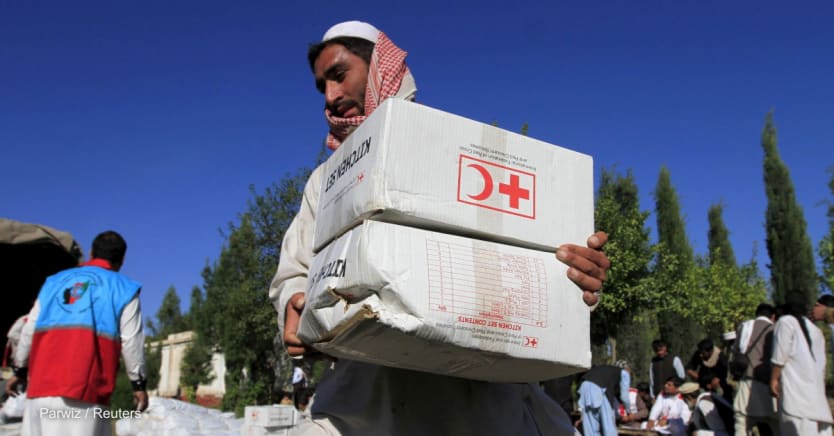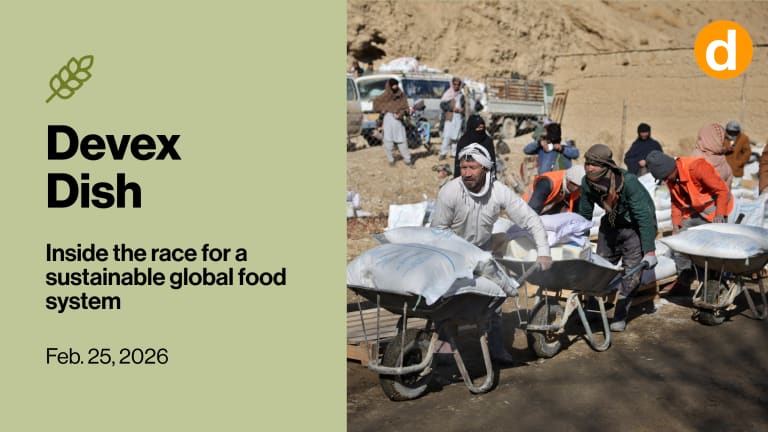
The hurdles that humanitarian groups in Afghanistan already face to deliver lifesaving assistance are only likely to get worse because of international sanctions, according to several experts who on Thursday called for the U.S. government to offer legal assurances so that aid groups can operate without fear of fines or prosecution.
Since the Taliban took over Afghanistan last month in a lightning-fast campaign that saw the government swiftly crumble, an air of uncertainty has hung over the country with regard to what is legal and what will land aid groups, donors, financial actors, and even private sector traders in trouble.
The Taliban are a specially designated group under U.S. sanctions law and in other jurisdictions as well. Due to the outsize role of the U.S. in the global financial system, it can be difficult for anyone to carry out international financial activities without somehow infringing the country’s sanctions laws.
Aid groups must navigate sanctions and Taliban to help Afghanistan
In the wake of the Taliban taking control of Afghanistan, aid and development workers are left with a lot of uncertainties. Sanctions could complicate access if rapid humanitarian exemptions are not issued, and it's unclear to what degree the Taliban will cooperate with NGOs.
The U.S. government must take into account that millions of ordinary people will suffer if its policies are aimed at stopping all transactions with the Taliban, according to Adam Smith, an international trade compliance lawyer with Gibson, Dunn & Crutcher LLP. His advice is for Washington to accept the inevitability of some “arbitrage,” meaning the Taliban may profit from certain transactions.
“If we allow nothing in because that’s the only way we can prevent any activity going to the Taliban, the result for the tens of millions of [Afghans] ... is going to be incredibly dire in the very immediate term,” Smith said at an event Thursday hosted by the Center for Strategic and International Studies.
His proposal for Afghanistan is that the U.S. publish something akin to a “white list” that would give aid groups broad room to maneuver while also assuring banks that they will not face legal action for working with aid agencies. Others have floated the idea of a general license for humanitarian action.
Basma Alloush, a policy and advocacy adviser for the Norwegian Refugee Council’s U.S. office, warned that just two weeks after the Taliban takeover, the situation is becoming quite severe, with financial access a major issue. Aid organizations are running out of funds to pay staff salaries and purchase goods.
Ordinary families, too, face limits on cash withdrawals from banks.
“They’re running out of money and are struggling to feed their families,” Alloush said during the event. Sanctions cause huge burdens, as organizations are forced to dedicate resources to circumventing the restrictions, while some groups simply give up.
“This is obviously a huge challenge for us and even more so on the local national NGOs,” Alloush said.
Western Union had stopped allowing customers to send money in and out of the country, only resuming Thursday in a limited capacity for inbound cash flows and largely centering services on the Kabul area. Other international financial institutions have become increasingly wary of working in Afghanistan because of the legal hurdles.
“They’ve got too much to risk,” Smith said. Banks can face significant civil and criminal penalties for violations, while their profits in a country such as Afghanistan are minimal in the first place.
Sue Eckert, a senior associate at CSIS who focuses on humanitarian issues, said the crisis in Afghanistan reveals a structural issue around sanctions that policymakers have long failed to address. However, in the short term, the U.S. must issue clear guidance for humanitarian action so that aid and financial flows do not freeze, she said.
“[The] humanitarian situation ... is not only dire, it’s gonna get worse. The economy is on the verge of collapse,” she said at Thursday’s event. “We need an element of realism here.”
Aid agencies have noted that the U.S. President Joe Biden acted quickly this year to reverse a decision of the previous administration that designated the Houthis in Yemen as a foreign terrorist group, specifically because of the humanitarian implications. They are hopeful this means the White House is open to ideas on Afghanistan, they say.
On the other hand, the Foundation for Defense of Democracies think tank is among the groups trying to pressure the Biden administration to increase sanctions on the Taliban and further isolate them — including by designating them a state sponsor of terror and a foreign terrorist organization, which would freeze all transactions with the group and its members.
Already, the U.S. has blocked nearly $9.5 billion in Afghan central bank funds held outside the country. The World Bank has evacuated staffers and effectively stopped work in Afghanistan, while the International Monetary Fund has refused to allocate $370 million in Special Drawing Rights to Kabul, citing the uncertainty. The European Union has frozen development funding.
Husain Haqqani, a former Pakistani ambassador who now works at the Hudson Institute think tank, supports some sanctions but proposed a middle ground to avoid inflicting suffering on ordinary Afghans.
“[The] humanitarian situation ... is not only dire, it’s gonna get worse. The economy is on the verge of collapse.”
— Sue Eckert, senior associate, CSIS“Sanctions have their place, but in some cases, they should be modified to save lives,” he wrote in a recent Washington Post op-ed. He proposes sanctioning individual Taliban leaders, rather than the whole group.
Alloush said global policymakers need to keep in mind that if they are promising humanitarian aid will not be stopped, then complementary measures are needed on the sanctions front.
“Part of ensuring that humanitarian aid continues is making sure that it’s protected and uninterrupted,” Alloush said. She called on the U.S. Treasury to clearly delineate “carve-outs” for humanitarian action. “It’s important that any political decision by this administration does not strangle the humanitarian response.”
Aid groups say they need to be able to reach vulnerable populations in conflict zones, even if armed groups controlling the territory are anathema to Western governments.
“We need to be able to access those in need with the goods and services regardless of where they’re at,” Alloush said.
Search for articles
Most Read
- 1
- 2
- 3
- 4
- 5








